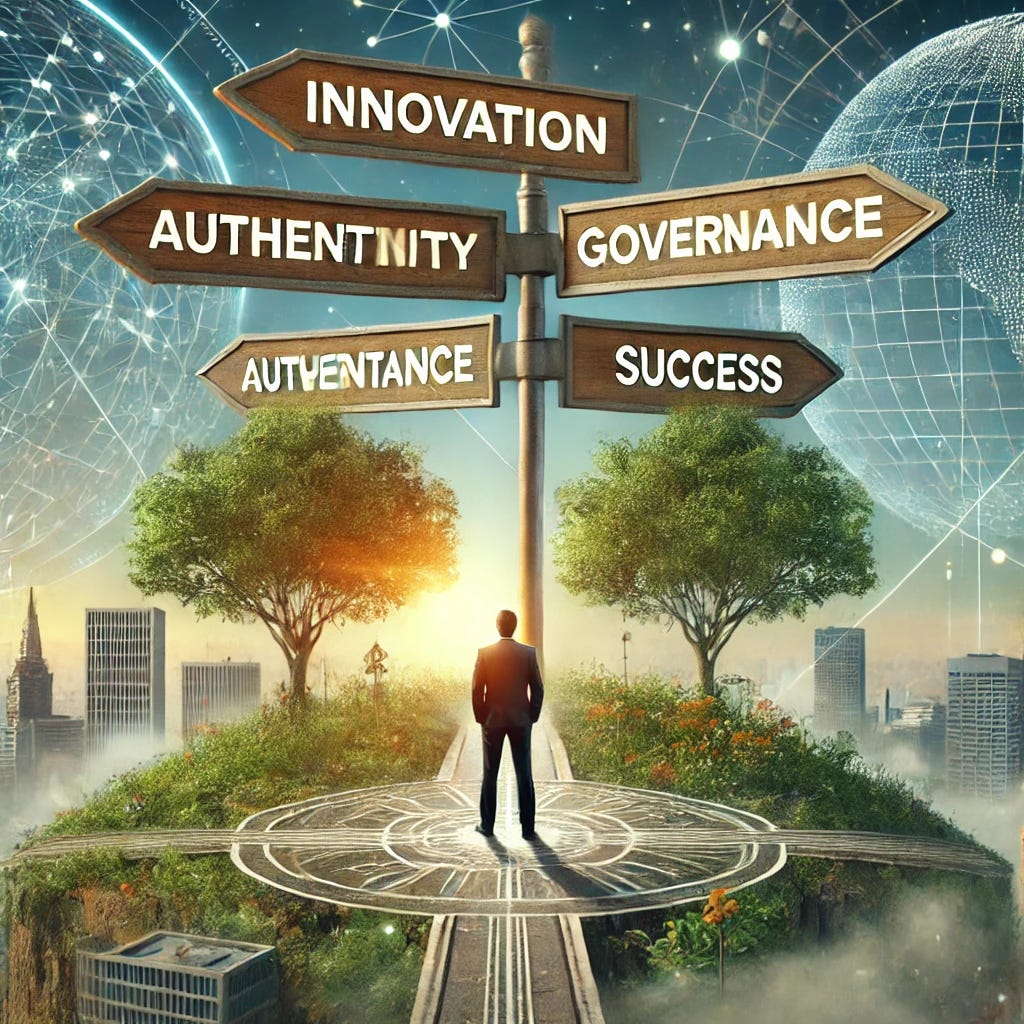As we approached the second anniversary of the book release “The Delivery Man”(have you got your copy yet?), the original idea evolved into this Substack but also into workshops to help companies find their “delivery governance” or product cadence. While the principles are well-established, it is time to share a bit more about the “secret sauce” behind the workshops. (based on feedback gathering, positive and negative but rarely bad. I got only 1 person who didn’t like it. His company however loved it).
In today’s rapidly evolving business landscape, the ability to balance technology with human-centric approaches is essential for sustainable success. “The Delivery Man” workshop provides that framework for professionals and leaders who want to transform their approach to innovation, governance, and self-empowerment. The key to this transformation lies in a careful balance of leveraging inspiration, embracing delivery governance, and maintaining authenticity in both personal and professional spheres. Communication is at the center of it.
The Rules of the 4 “I’s”: Inspiration Over Imitation
At the core of “The Delivery Man” philosophy is the idea of moving beyond mere imitation. Instead of following the trends set by others, the focus is on finding inspiration that fuels original invention. In an era where competition is intense and innovation is rapid, resorting to imitation is the easy path, but it is not sustainable. Real growth and progress come from integrating ideas, refining them through personal insights, and ultimately crafting innovations that add value.
This approach is summed up in the workshop’s advice: “Originate, don’t imitate,” attributed to George A. Hormel. Rather than copying others, participants are encouraged to find the creative spark that allows them to build something uniquely their own. This focus on originality doesn’t come at the expense of practicality, but it encourages a mindset that seeks to blend practicality with creativity.
Open Innovation: Collaboration Over Isolation
Open innovation is a major theme throughout the workshop. This concept highlights that innovation doesn’t always come from within an organization. By being open to external ideas, partners, and even competitors, companies can foster a collaborative ecosystem that leads to breakthroughs and growth. When at Mastercard, we observed first hand the amazing contributions of participants to our hackathons “the Masters of Code” who delivered ideas and innovative ways to use our products beyond our wildest dreams. This is crucial in today’s decentralized and interconnected world, where the traditional model of centralized control is no longer efficient.
In fact, the workshop points out that the internet, once hailed as the great equalizer, has not completely solved the issues of identity and authenticity, as humorously highlighted by the quote: “On the Internet, no one knows you’re a fridge pretending to be a dog”(a subtle nod to Dave Birch theory). The evolution from this early digital confusion to more complex concerns—such as bots and hacked identities—illustrates how open innovation can help address emerging challenges by integrating diverse perspectives and technologies.
Authenticity and Self-Empowerment: Owning Your Story
At the heart of the workshop is a focus on authenticity. Participants are encouraged to take control of their narratives—both personal and professional—and ensure they reflect their true selves. The workshop emphasizes the importance of blending one’s professional success with personal integrity, arguing that these elements are not mutually exclusive. In fact, the most sustainable success comes from aligning one’s work with personal values.
By crafting a structure that doesn’t compromise these values, individuals can maintain strong relationships and foster both personal and professional growth. The principles laid out in “The Delivery Man” help individuals reframe how they perceive their contributions, promoting a sense of self-worth that is rooted in their accomplishments while also prioritizing well-being. And why is authenticity critical? Because it is at the core of trust, transparency, and communication, the greatest strengths of any team trying to deliver something.
Delivery Governance: More Than Just Agile
One of the more technical aspects of the workshop revolves around delivery governance, which is framed as a broader and more strategic approach than Agile or SDLC. While Agile focuses on the efficiency and adaptability of the development process, delivery governance encompasses the entire delivery lifecycle, including planning, execution, monitoring, and closure.
This holistic approach to project management highlights several key elements that are essential for success:
1. Risk Management: Identifying and mitigating risks early ensures smoother project execution.
2. Quality Assurance: Ensuring that deliverables meet predefined criteria and stakeholder expectations.
3. Compliance and Regulation: Especially critical in industries subject to legal and regulatory scrutiny.
4. Strategic Alignment: Projects must align with broader business goals to maximize value.
The key takeaway here is that delivery governance isn’t just about getting things done efficiently. It’s about aligning projects with strategic goals, ensuring quality, and managing risks, all while adhering to compliance requirements. It expands on the Agile mindset, offering a more structured framework that helps technology leaders take a more comprehensive view of project management.
SSOCCADD: A Strategic Mindset for Delivery
A major tool introduced during the workshop is the SSOCCADD methodology, which stands for Situate, Secure, Observe, Communicate, Control, Analyze, Distribute, and Decide. When we created it at PayPal, the idea was to find a structured and faster way to respond to urgent matters (think cybersecurity). Since then, former PayPalians have taken it to their new companies and following these workshops, an extended version from the book was created (as discussed here). This framework is designed to help professionals quickly assess situations and make informed decisions in a structured manner. If you know the OODA Loop, look at SSOCCADD as the same principle adapted to modern days dynamic and digital environments decision making.
In essence, SSOCCADD breaks down complex problems into manageable parts:
• Situate: Understand your position in the broader context.
• Secure: Rapidly establish a secure footing in any environment.
• Observe: Refine your understanding of the situation by paying attention to details.
• Communicate: Share critical information with the right stakeholders.
• Control: Ensure key elements are managed effectively.
• Analyze: Break down the available information and assess impacts.
• Distribute: Share the results of your analysis with your team.
• Decide: Make an informed decision and take action.
While this framework has its roots in technology and security fields, its principles are widely applicable to any situation where quick, informed decision-making is critical. Whether managing a project or navigating personal challenges, SSOCCADD offers a methodical approach to problem-solving.
The Delivery Mindset: Bringing It All Together
Ultimately, the workshop’s focus is on fostering a delivery mindset—a way of thinking that combines inspiration, governance, and personal integrity. Participants are encouraged to apply the principles of delivery governance and the SSOCCADD methodology to all areas of their lives. By doing so, they not only increase their chances of professional success but also ensure that their success is meaningful and sustainable.
One of the most powerful messages from the workshop is the importance of clear communication and documentation throughout the project lifecycle. Keeping stakeholders informed, maintaining transparency, and ensuring that decisions are well-documented are critical for long-term success.
The delivery mindset is about more than just getting things done—it’s about doing them in a way that aligns with your values, fosters innovation, and creates lasting impact. Whether you’re a leader in technology or just beginning your career, the principles shared in “The Delivery Man” workshop can help guide you towards a more empowered and authentic professional journey.
From Inspiration to Delivery
In short, the essence of “The Delivery Man” workshop is about embracing inspiration, fostering open innovation, and aligning delivery governance with broader strategic goals. By combining these elements with a commitment to authenticity, participants can transform their approach to leadership, innovation, and personal success.
In a world where technology and human dynamics are increasingly intertwined, the lessons from this workshop offer a roadmap for navigating complexity, fostering collaboration, and delivering meaningful outcomes. The focus on delivery governance and the SSOCCADD methodology provides a comprehensive framework for tackling challenges and seizing opportunities, both in business and in life. It is demonstrated each time before I start digging into the core components of the workshop. I use life examples on how to interact as a human IRL and socially. It helps set the stage for lively discussion. Give it a try, it can be quite amazing.










